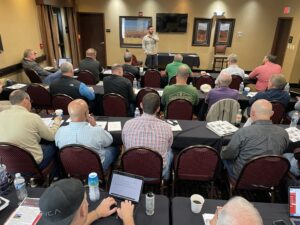
 Much has been said in the last two years concerning the influence of religious faith upon the ballot box. Following the massive turnout of "values voters" in the last election, it is suddenly in vogue for candidates of both major parties to passionately affirm their own personal religious convictions and to declare their unflagging commitment to family values (even when private behavior might contradict such claims). It seems political candidates posing as loyal faith and family advocates have popped up everywhere. But this recent — and likely temporary — political obsession with such things should not surprise us; politicians have hitched a free ride on the train of popular trends for generations.
Much has been said in the last two years concerning the influence of religious faith upon the ballot box. Following the massive turnout of "values voters" in the last election, it is suddenly in vogue for candidates of both major parties to passionately affirm their own personal religious convictions and to declare their unflagging commitment to family values (even when private behavior might contradict such claims). It seems political candidates posing as loyal faith and family advocates have popped up everywhere. But this recent — and likely temporary — political obsession with such things should not surprise us; politicians have hitched a free ride on the train of popular trends for generations.
Such political opportunism should have no bearing on the Christian's perspective on civic responsibility. We are called to rise above such prattle, for our ultimate loyalties rest in our True King, and His Kingdom priorities supersede all earthly political agendas and ambitions.
For this reason, some have mistakenly suggested that Christians have little or no responsibility in the civil arena. Actually, a review of key portions of Scripture reveals a different prospect — one that calls Christians to recognize the Lord's expectations of our government and to act accordingly.
God's Concern for Civil Standards
In Isaiah 1:17, God commanded Judah to uphold justice, stand for the oppressed, and protect the helpless. But the Bible also reveals that these basic expectations for civil government were not restricted to Judah; they actually apply to all governments of the world. Consider the following:
First, God is the ultimate source of all justice.1 This truth was revealed to Judah, but it was not restricted to the civil structure of Judah. He is the source of all justice. Therefore, all civil structures that are founded on a system of justice must ultimately look to Him for the true essence of justice.
Next, the Bible teaches throughout that all kings and all kingdoms fall under His rule and must answer to His absolute authority. There is no government that is exempt. The Scriptures boldly proclaim that all earthly governments exist because of Him and are subject to His rule. He is the King of Kings and Lord of Lords!2
Third, we find that God's standards of justice were not restricted to Judah, that as the absolute King over every kingdom, He expects every earthly kingdom to follow His standards of justice.3 He further indicates that He expects all kings, rulers, and princes to follow His standards of justice (Proverbs 8:14-16).
These expectations also are demonstrated in the New Testament where God declares His authority over every government and His expectation of those governments to protect the citizens by punishing criminals (Romans 13:1-6; 1 Peter 2:13,14).
The fourth point provides perhaps the most compelling evidence for God's universal expectations of civil justice. The multiple accounts of God's judgment upon nations that defied His standards of justice verify His expectations of these secular governments. Consider the example of the Canaanites. The Scriptures declare that the Israelites' possession of Canaan was an act of God's judgment upon the kingdoms of Canaan.4 Their legalized perversion destroyed families and victimized the helpless. Their child sacrifices exemplified the legally-sanctioned destruction of innocent life. Such travesties mocked God's standards of justice. Civil structure was designed to maintain these elements of God's justice, but in Canaan the people and their leaders consistently failed to do so. Therefore, God pronounced judgment upon them.
We find another example of secular civil injustice in Assyria. Scholars paint a brutal picture of this ruthless kingdom that was notorious for its violence and cruelty. When Jonah proclaimed God's judgment, the king led out in calling for repentance from their violence (Jonah 3:8). But the revival didn't last, and eventually Nahum returned to Assyria with another prophecy against their empire. Here we find evidence of sexual sin and continued brutality (Nahum 3:1-4, 19). Such practices are inconsistent with God's civil standards of justice, and God held the civil leaders accountable for these civil and moral failures.
Through the prophet Amos, God condemned several nations who denied His standards of justice.5 Each of them violated foundational principles of God's justice, and God promised judgment upon them and their nations for their unjust actions.6
God expected these secular governments to maintain His basic moral standards of justice (especially standards of sexual morality and the value of human life) and to protect the oppressed and helpless. Furthermore, these examples show that God held them accountable for these expectations and judged them accordingly.
The Bible is clear: God is the source of all justice, He has absolute authority over every kingdom, He expects every government to keep His basic standards of justice, and He ultimately judges every government that fails to maintain His basic civil standards.
And God has not changed. But should we dare suggest that God might expect the United States Government to operate according to these same basic principles? Does God expect our nation to abide by moral civil standards that are rooted in the Person of God?
Does He expect the judicial and legislative functions to be free from the influence of gifts and bribes? Is God truly concerned about the victims in our society, those who have suffered at the hands of the ruthless? Is He still opposed to a civil structure that not only allows sexual perversion, but seems at times to endorse it? And does God's heart cry out for the helpless and defenseless children who are slaughtered annually with no civil structure to protect them?
Unequivocally, undeniably, and absolutely YES! His nature has not changed, and His civil expectations apply to us.
God is still the source of justice, He is still the absolute King over every king and nation, He still expects the nations to abide by His justice, and He still promises judgment to all kings and kingdoms that do not bow down to Him. And the U.S. Government is not exempt.
The Responsibility of God's People
But what does that have to do with us? Consider the following:
When God delivered Israel from Egypt, He took them into the wilderness and established a covenant with them in which He would view the people of Israel as "His people" and they would view Him as "their God."7 In this relationship, God would treat them as His own "treasured possessions," pouring His affection, blessings, and love upon them (Deuteronomy 7:6-9). They, in turn, were to focus their love and obedient faithfulness upon Him (Deuteronomy 6:1-9). In this unique and loving relationship, God identified them as His special, chosen people (Deuteronomy 7:6). Their deliverance from slavery and very existence as a nation was a demonstration of the special relationship they shared. The nature of the Jewish people was that they had been lovingly chosen.
Furthermore, in God's instruction to His people He indicated that because of this special and unique relationship, they were to be like Him. God identified Himself as holy, and so He called His people to be like Him in holiness (Leviticus 11:44; 19:2). The Lord identified several areas that He viewed as "detestable," and He expected His chosen ones to view these same things as detestable.8 God's deliverance from bondage and the establishment of this special relationship should have moved God's people to eagerly embrace His concerns and values.
Finally, God expected His people to reflect the nature of God to the neighboring nations. When God instructed His people to obey His commands, He told them that the neighboring nations would see their obedience and realize that they belonged to God (Deuteronomy 28:9-10). He also pointed out that if they obeyed and followed Him, other nations would see and respect their wisdom (Deuteronomy 4:5-8). This pointed directly to God, for it was the Lord who gave them the wise commands to follow. The people's actions were supposed to send a message to the world about God's greatness and love.
Because of His nature and relationship with Judah, God's people were supposed to reflect His concern in the areas of justice, relief for the oppressed, and defense of the helpless. When the world looked at their behavior, it should have viewed a living illustration of God's love and compassion in each of these three areas.
But, again, how does this apply to our responsibilities as Christians in the civil structure? Does God expect us to play an active role in maintaining His civil standards? It is clear that we are citizens first in God's eternal Kingdom and that our affections and energies belong first to that King. But does this precious truth exempt us from embracing and reflecting God's priorities until we go to be with Him?
When we look to the New Testament, we find some striking similarities and expectations. It teaches that through the blood of Christ, God has delivered us from cruel bondage to sin (Romans 6:15-18) and established a "new covenant" with us (Luke 22:20). Those who have been miraculously delivered from this slavery to sin are also called "… a chosen people, a royal priesthood, a holy nation, a people belonging to God…" (I Peter 2:9).
Also, in the same way that Judah was to embrace God's priorities, we, too, are to embrace His priorities. He instructed us to be holy as He is holy (1 Peter 1:16) and to love each other because He loved us and because He is love (1 John 4:7-8). God calls His chosen ones to hate what is evil, cling to what is good (Romans 12:9), and to seek first His Kingdom (Matthew 6:33).9 God still expects His chosen people to share His concerns and embrace His priorities.
Finally, in addition to our status as His chosen people and our responsibility to embrace His priorities, we too are to reflect His nature to the world around us. When the lost observe our behavior, they should see an accurate picture of God's glorious nature (1 Peter 2:12). When they watch us relate to each other, they should learn of the Lord's love (John 13:34, 35; 17:23). When the world views our marriages, it should see a picture of the relationship that exists between Christ and the Church (Ephesians 5:22-33).
These New Testament commands apply first and foremost to the church, not modern America in general. But as those who have been called by God, it is our duty to influence our nation accordingly. As God's people our priorities, actions, and affections are to project His nature to the world so that the lost can get a small glimpse of what God is like.
God has indeed delivered us from bitter slavery and brought us into a loving relationship with Him. Because of this incomparable love and grace, we should respond by eagerly embracing His concerns and actively reflecting His nature.
Implications
God has absolute authority over all civil governments, including the United States. He has basic civil expectations of justice, relief, and protection from all civil governments, including the United States. In addition, these civil expectations are not merely codes, but a reflection of the very nature of God and His love. Moreover, it is clear that God expects His people to embrace His desires and reflect His nature. Finally, we live in a nation where the leaders are elected by the people to reflect the desires and priorities of the people.
Therefore, if God's heart breaks over our nation's civil immorality, tears ought to flow from our eyes. If we care about the things which concern God, we should be concerned about blatant violations of His most basic civil expectations of justice, relief for the oppressed, and protection for the helpless. Because our government is "representative," we are obliged to seek representation of God's concern on moral issues. If we have the legal means to reduce, and in some cases eliminate, the most flagrant examples of civil immorality through the election process, would God expect us to do any less? And when God's people fail to address these issues, we convey a false message to the lost about God and His nature.
God is still concerned about fairness in the business realm. But when we ignore a candidate's past record of business dealings, we fail to share God's priorities and accurately reflect His concerns. The Lord truly cares for the innocent victims of legalized gambling. Yet, when we do not oppose gambling at the polls, we neglect His concerns and portray a false image of God.
Our Father is still opposed to the destruction brought through sexual immorality and perversion. But when we fail to call on our elected officials to stand against legalized and state-sanctioned immorality and perversion, can we justify our passionate claims that we follow the Lord?
God is still passionate in His concern for the helpless and oppressed. In His love, He still holds the human life precious and wants life protected. Yet, when we elect so-called "pro-choice" candidates (or allow their election by not voting!) who perpetuate the legalized slaughter of helpless children, how can we honestly claim to love God?
And when we remain silent at the polls, or don't call our representatives to action in these areas, the watching world could falsely conclude from our actions that God is not really concerned about these issues. They could then logically conclude that the vocal minority of politically active Christians don't truly represent God's heart, but are instead, "religious right" fringe fanatics who should be dismissed as such.
The primary concern for Christians as we approach November 7 is not the political affiliation of the candidates, but rather which candidate would best accomplish an agenda that lines up with God's standards of justice — standards that are not shaped by party affiliation or platforms.
This election, Christians have yet another opportunity to reflect God's priorities and concerns in these areas by electing representatives that will stand for the issues that matter to God. To do less not only sends a false message to the watching world, it ignores the priorities — the heart — of the One we claim to love.
1 Deuteronomy 1:17 and Isaiah 40:14
2 Psalm 2, Proverbs 8:14-16, Daniel 4:19-37 (especially verse 25 & 34), John 19:10,11, Romans 13:1-7, Ephesians 1:20-22, Philippians 2:9-11, I Timothy 6:13-15, and Revelation 1:5; 17:14; 19:16
3 Ezekiel 5:6-7; See also Herntrich's notes Theological Dictionary of the New Testament, Vol. III, p. 932
4 Genesis 15:16, Leviticus 18:24, and Deuteronomy 9:1-6
5 The Arameans 1:3, the Philistines 1:6-9, the Edomites 1:11-12, and the Ammonites 1:13-14
6 For additional passages showing God's judgment on secular kings and nations, see Psalm 2:10-12, Ezekiel chapters 26-32 and 38-39, Daniel 5:18-30, Revelation 6:15-16 and 19:17-21. Consider especially Isaiah's prophecy against Babylon for ruthless brutality and oppression in 13:11 and 14:3-6. Also, Habakkuk presents God's judgment on Babylon for greed, extortion, plunder, bloodshed, unjust gain, unpunished crime, and sexual immorality (2:5-17).
7 Ezekiel 6:2-8; 24:1-9 and Deuteronomy 29:9-15
8 Deuteronomy 7:25-26; 13:12-15; 18:9-13; 25:13-16
9 In fact, a convincing argument could be made that seeking first His Kingdom actually requires the pursuit of justice.















